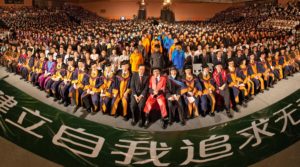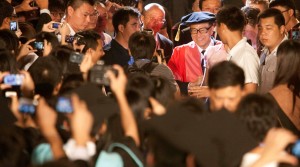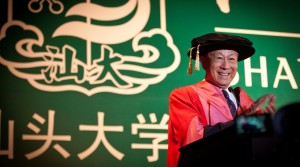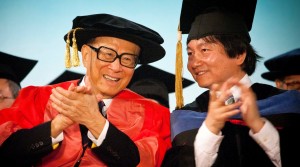(Shantou and Hong Kong, 29 June 2011) Mr Li Ka-shing, Honorary Chairman of the Shantou University Council, touched on the topic of “Why can’t you be the next Li Ka-shing?” today when he encouraged graduates of STU not to simply follow the path of others.
Delivering his speech titled “When Lemons Become Lemonade” at the STU Commencement Ceremony, Mr Li said youngsters should instead learn from other people’s successes and determine for themselves their own destinies with their unique abilities.
Also attending today’s Commencement Ceremony as guest of honour was STU’s new Council Member and Director of Yale Stem Cell Center, Professor Lin Haifan. Today’s ceremony saw more than 2,300 graduates being conferred with under-graduate, master and doctoral degrees.
STU has also planned a mountain-climbing project in September as the university’s major activity this year. Mountaineering requires the courage to explore and the proactive attitude to take on challenges in order to succeed, which are the attributes that STU always wants its students to develop and possess.
The mountaineering team will aim at Mount Shishapangma, the only mountain located entirely within the Chinese borders with a height of over 8,000 metres. Four professional climbers have been hired by STU to lead a team of 16 students to take a new route from the southwest to reach the peak. A pledging ceremony was held at the commencement today, with Mr Li presenting a flag to signify the kick-off of this project and wishing them all the best with their endeavour.
The following is the speech by Mr Li at the ceremony:
Vice Minister Hao, Professor Lin, Distinguished Faculty, Parents, Friends and Graduates,
On behalf of the University Council, I would like to welcome all of you here today to celebrate this momentous occasion for our new graduates. Congratulations! You have worked hard for 16 years to earn your place here, and you are ready for a new chapter in this adventure called life.
Just when you think you have lived long enough to see everything under the sun, something comes along that you cannot begin to understand, yet explain. This is how I feel with the recent and fervent media discussion about whether young men and women should want to be ‘me’. The seriousness with which it is being taken is flabbergasting and rather amusing as the premise of the question seems shallow. Every individual is unique and endowed with talents and experiences that will determine his or her destiny. We should not follow blindly in another’s footsteps, but lessons learned from the experience of others can be invaluable.
Frankly speaking, I am happy that I am myself! That said, it does not mean that at times I have not yearned to be a medical doctor, a scientist, or a professional golfer. To me, the joy in life is not the destination but the difficult journey. Su Dongpo the poet spoke of “Meals without meat, sickness without medication, house without a roof…” in describing an impoverished life devoid of daily necessities. My childhood was spent in abject poverty circumstances much worse than what Su described. Still, I found joy in doing the best I could with what I have been given, and that includes not only talents, interests, and successes, but the pain, setbacks, hardships, and even heartbreaks that have marked different periods of my journey.
This recent debate has prompted me to reflect on my journey and to ponder what might be different if I had to start all over again. Life is filled with so many ‘what ifs!’ They are unpredictable and beyond our control. What if war hadn’t destroyed my childhood and the opportunity for schooling? What if my father had not passed away when I was still a child, leaving me with the responsibility to care for my mother and family? What if I had the opportunity to stay in school? Given my passion for medical knowledge, would I have become a doctor? Would my passion for reasoning and discoveries have driven me to become a scientist?
Of course, I shall never know because fate has destined me for something else. In the process, however, I learned something of great value — even amid adversity and challenges we can fire up our capabilities and become more than what we thought we could be.
When I was growing up, life in Hong Kong was truly harsh and often cruel. Society’s safety net then was near non-existent. The fear of starvation and sicknesses was very real. Education was a privilege enjoyed by only a select few. And impoverishment could be a life sentence. Today’s newly found abundance has moved us beyond these conditions, basically providing an adequate cushion for most. Poverty now goes far beyond the absence of money to include an acute sense of disillusionment towards hope and even opportunity. Many fear or perceive that the gateway to generational progress seems to be narrowing, making it more difficult to escape the confines of disadvantages.
I understand these fears as I have lived them. No one wants to be doomed to poverty, but where is the exit?
Seventy years ago when I was 14, this was the question that weighed on my mind every night. My father whom I loved very much had passed away, and I needed to provide for my widowed mother and my young siblings, without education and access. I had no network of support. Would hard work and perseverance be enough to see us through? Or are we doomed by fate? Even if I could make a living, would I be able to make a success of my life?
I quickly discovered that trying to find a formula for success in life would be a futile endeavor. I should focus instead on differentiating between things which are within my control. If success was my goal, it is important to control things within my power that can turn the tide around. I must recognize the shackles of poverty – I must escape the dangerous tentacles of disease, ignorance, dishonesty, and apathy.
For example, when I found out I have TB, I was determined to stay healthy and fit by consuming the appropriate amount of food, getting exercise, and focusing on cleanliness and hygiene. In addition, I must pursue knowledge for intellectual gain and escape ignorance by dedicating myself to a lifetime of reading and learning to stay curious and relevant. For the past 70 years, even after a 12 hour day, I always try to learn. To let you on a secret, for the past year I have worked tirelessly to understand the mathematical intricacies of evolutionary algorithms because I want to comprehend the impact of AI and what it means in the future.
I could control apathy and dependency by being disciplined in my conversation, commitments, and goals. Not only was this mindset empowering, it can build up trust; and your character will exude discipline, order and humility.
All these elements aligned has a multiplier effect: it will fettle and mold a framework for success, as it better prepares you to address circumstances that are out of your control and when the time comes you will have the courage and the know-how to follow the road less travelled. No one can tell you where that road will lead and the how your life will flow. In the process, you will discover the truth Winston Churchill offered so many years ago: “Difficulties mastered are opportunities won. Attitude is a little thing that makes a big difference.”
You are capable of turning the lemons life throws at you into lemonade. When you develop a map for your soul, you will discover the part of you that loves life, the part of you that is analytical, capable and responsible, and the part of you that is principled, idealistic, and able to serve society with selflessness. Congratulations again to all of you. Today you are proud to be a part of Shantou University. Tomorrow Shantou University will be proud to be a part of you.
Thank you very much. Good luck. I wish you all the best.





